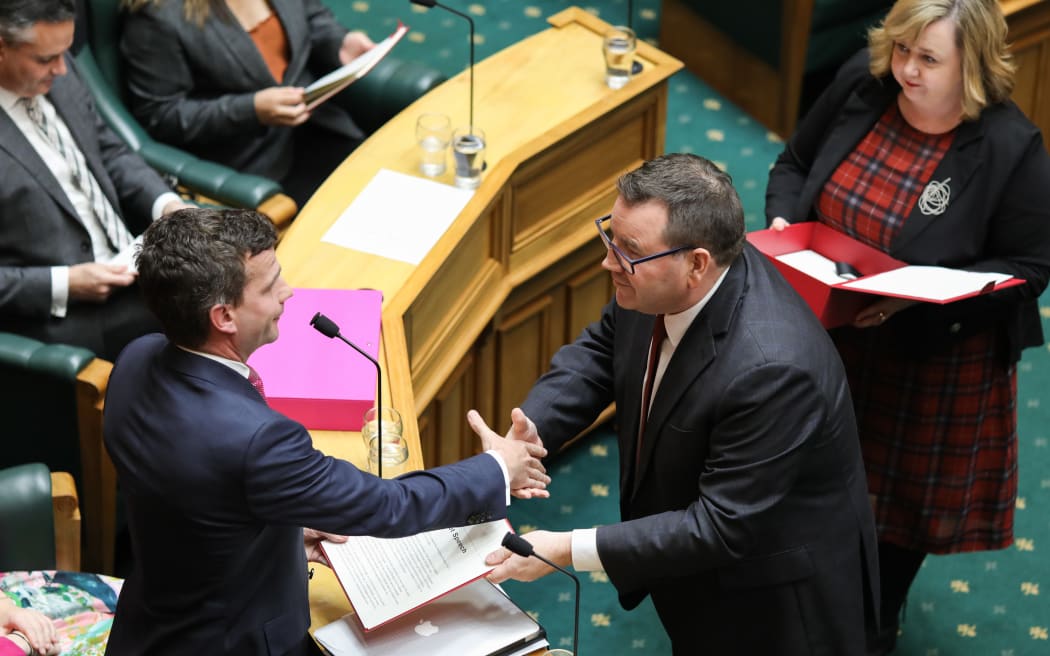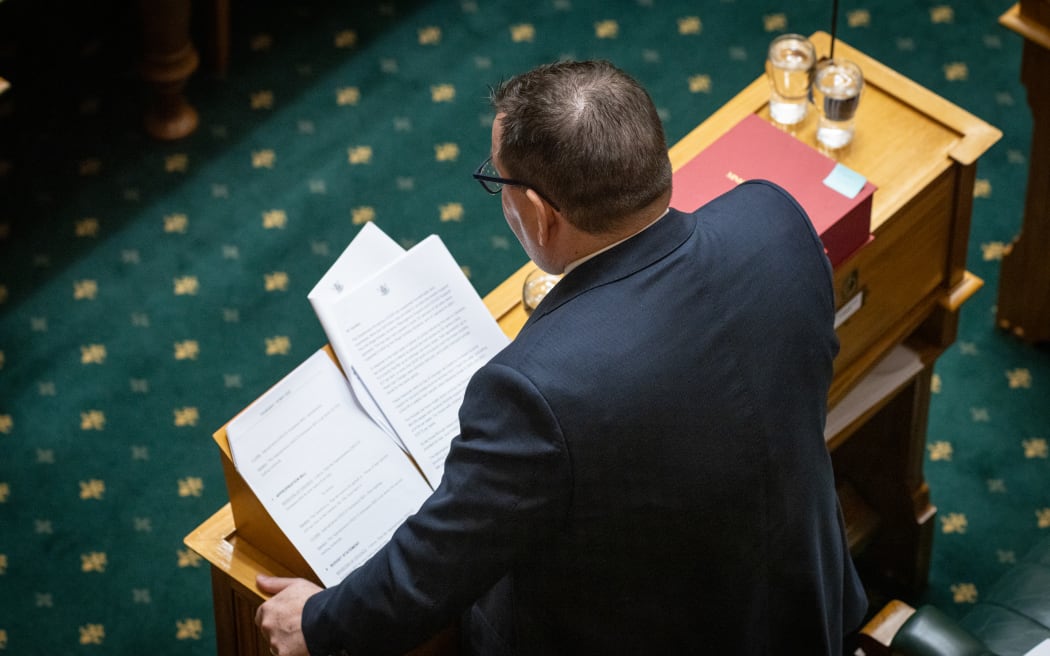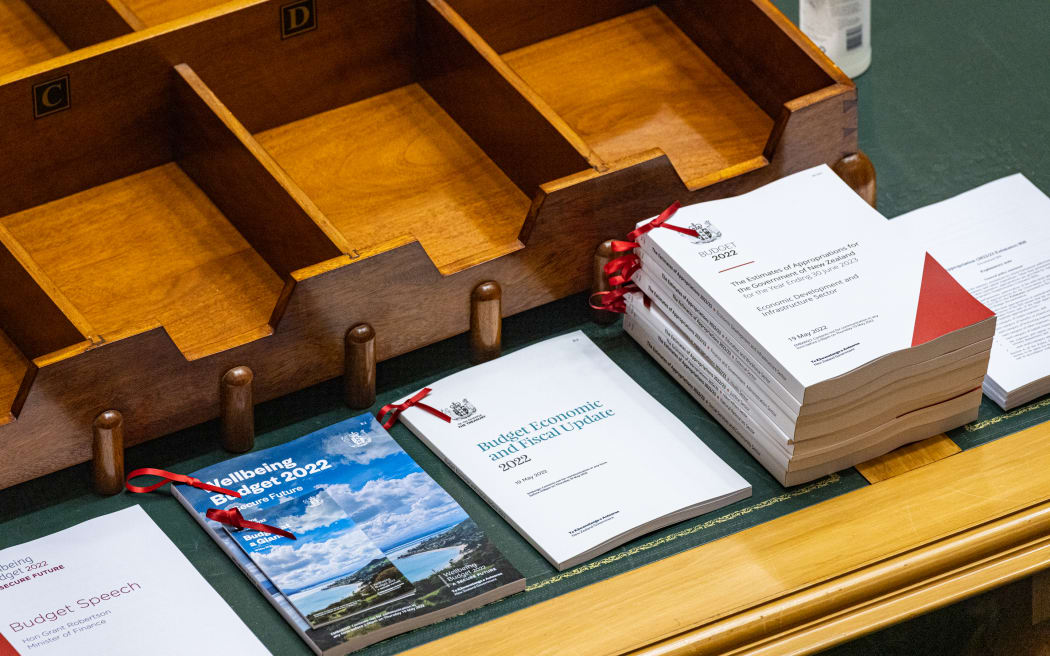The annual Budget is to be delivered by Finance Minister Grant Robertson this Thursday at Parliament, and you’d be forgiven for thinking it’s all a bit of a fuss.
Of course there’s a great deal of public interest in the important fiscal and political event, but also a well worn set of traditions involved around the process that plays out at Parliament, as the minister explained to The House.

Grant Robertson gives a copy of the budget speech to David Seymour Photo: ©VNP / Phil Smith
It begins with Robertson walking to the chamber ahead of the start of business at 2pm, carrying boxes of Budget documents, assisted by deputy Finance Minister Megan Woods. He hands a copy of his Budget speech each to leaders of the other political parties in Parliament, as well as the Speaker and the Hansard reporter present.
“It’s not written down anywhere that we have to do that, but it’s part of the ceremonial nature of what’s a pretty big day for Parliament,” Robertson explained.
At 2pm on Thursday when the House convenes, the Budget and its attendant documents get tabled when the Finance Minister introduces the first reading of the Appropriation 2023/24 Estimates Bill. Robertson said this would include the Wellbeing Budget document, the Budget at a Glance document, and also the Treasury’s Budget Economic & Fiscal Update.
Lock-up
The Budget documents are embargoed until 2pm. However, from 1pm, political parties (and permitted media outlets) go into a “lock-up” in the Beehive, where they have access to the documents in advance of their tabling.
“It’s another long-standing tradition where governments give opposition parties some time with what are a pretty complex set of documents,” Robertson said.
Those in the lock-up can’t leave until the bells start ringing for the House to sit at 1:50pm. So in the meantime, if you’re walking by outside the lock-up room and you hear screams from within, it’s probably not those trapped inside feeling tortured, but more likely yelps of delight by the Budget nerds who positively love this event.
Snack ritual
According to Robertson, it's the former Prime Minister Bill English who was to blame, when he was Finance Minister, for starting the ritual of eating a pie on Budget morning as a way of marking this important day.
“When I came into office, as a good Dunedin boy, I decided we needed cheese rolls, and we’ve had a variety of sources of those cheese rolls, over the years - some flown up from Dunedin one year, and also produced here in the office,” Robertson noted.
“The Prime Minister usually pops down, usually just to wish me good luck. We have a cheese roll and a chat beforehand. It’s sort of an acknowledgement that it’s a special day.
“I remember when I was the Opposition’s finance spokesman, going to have my hair cut the day before the Budget, and the very nice person who was cutting my hair at the time laughed and said ’you do realise I had Bill English in here last night?’. So, you know, Wellington’s a small town.”
Debate
The Bill’s first reading has no debate attached. The second reading swiftly follows, and it’s then that the Budget Statement is delivered by Robertson - this can take from 35 to 40 minutes depending on his “will and whim” - commencing the debate.
The minister is followed by the Leader of the Opposition, then the Prime Minister, then the leaders of each political party. They each are allowed to speak for up to 20 minutes. Then the budget debate continues after that, subject to adjournments, with individual members allowed up to ten minutes each in which to speak.
At some point on Thursday, it’s expected that a motion will be moved for the House to go into urgency, which typically takes the House as late into the week as Friday or Saturday, but Robertson wouldn’t be drawn on the schedule this time.
“It’s usually traditional that the Government will have some bits of legislation that relate in some way to the Budget that they want to kick off quickly. So the House will go into urgency, and I’ve signalled that that is what we will do.

Grant Robertson presents his budget speech to Parliament Photo: Phil Smith
“Usually those bills revolve around the finances of government or some policy issues that are dealt with in the Budget. Sometimes it can be a matter where the government had concluded it needs to put all of the stages of a bill through for a particular reason. It may be to avoid arbitrage by somebody outside the House or something like that. Other times it might just be the first reading of a bill relevant to the Budget to get it off to a select committee to get the work started on it.”
Robertson wouldn’t be drawn on how long he expects the week to last under urgency, but said they’d have discussions with other parties via the Business Committee during the week.
Refined process
Having been Finance Minister since the Labour Government came to power in 2017, this is Robertson’s sixth Budget. He said they’ve refined elements of the Budget process.
“We’ve certainly refined the way the documentation looks, and tried to make it easier to navigate and use. Obviously we brought the Wellbeing Approach in in 2019 and that changed things quite a bit in terms of the content of the document, to try and look not just at the numbers and the spreadsheets but also actually look at why we’re doing what we’re doing, and how we’re going to measure our success. So that’s changed the nature of the document, it’s changed the nature of what I as minister talk about.
“Budgets have been very, very dry in the past. I used to compare it to the way private sector does an annual report, where the back half of a business’ annual report will be a profit and loss statement, but the front half will invariably be them telling you about why they’ve done what they’ve done, and what they’ve done. And really we’ve just caught up with that, and put it into this wellbeing framework.”

Photo:
“There’s a rhythm to the process that is familiar, but as I’ve discovered each year pops up its own challenges, and this year obviously we had the cyclone and flooding at the start of the year. The budget process really kicks off in August of the previous year, and by January, February things are shaping up. So to have that tragic event come along that obviously meant that we had to reset and re-cast a few things. So I’ve got used to things disturbing the budget creation,” Robertson said.

